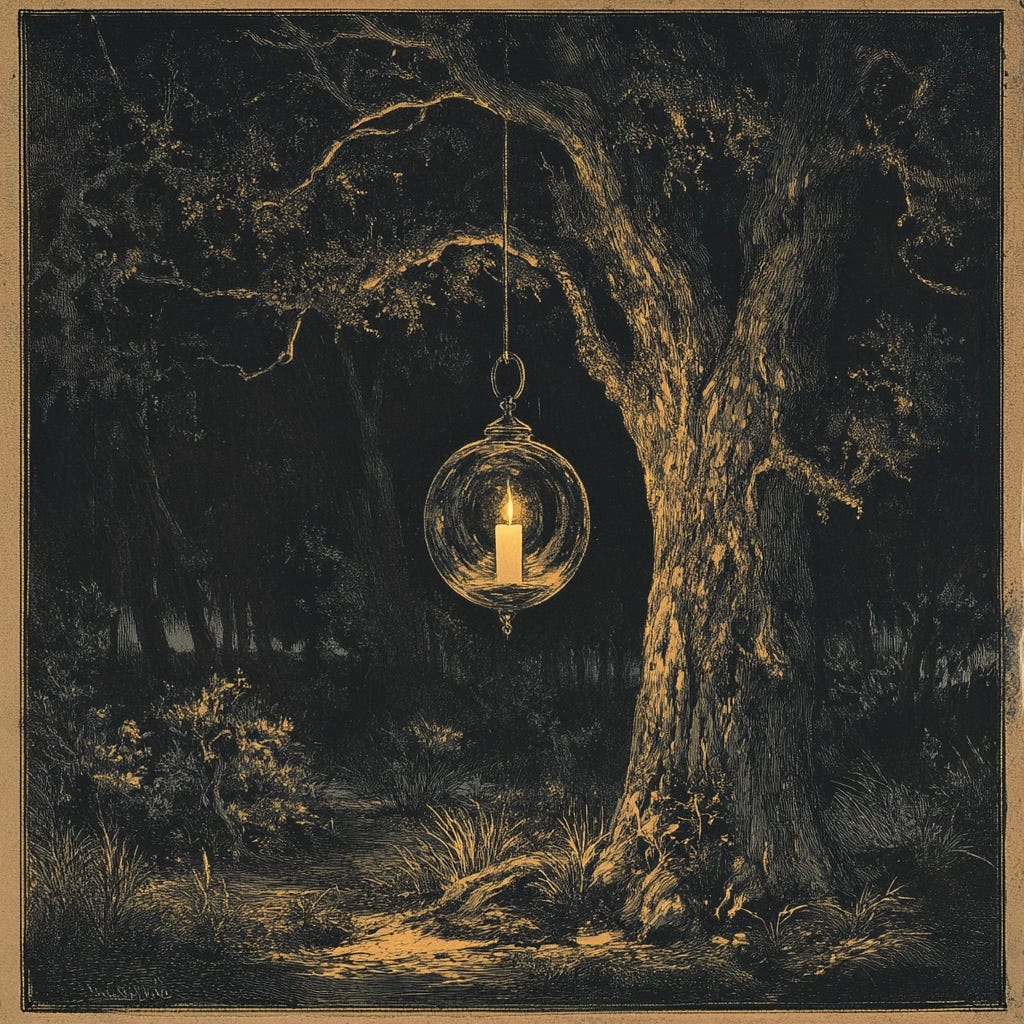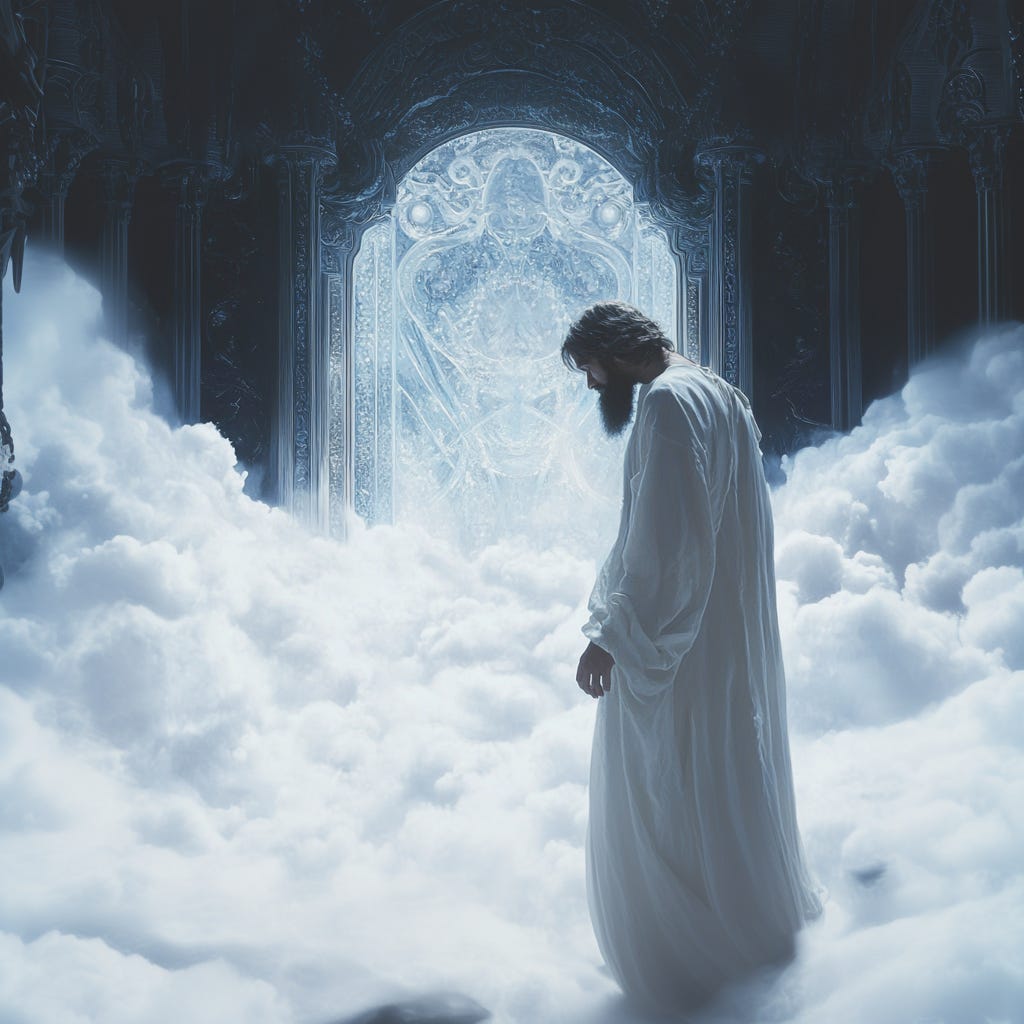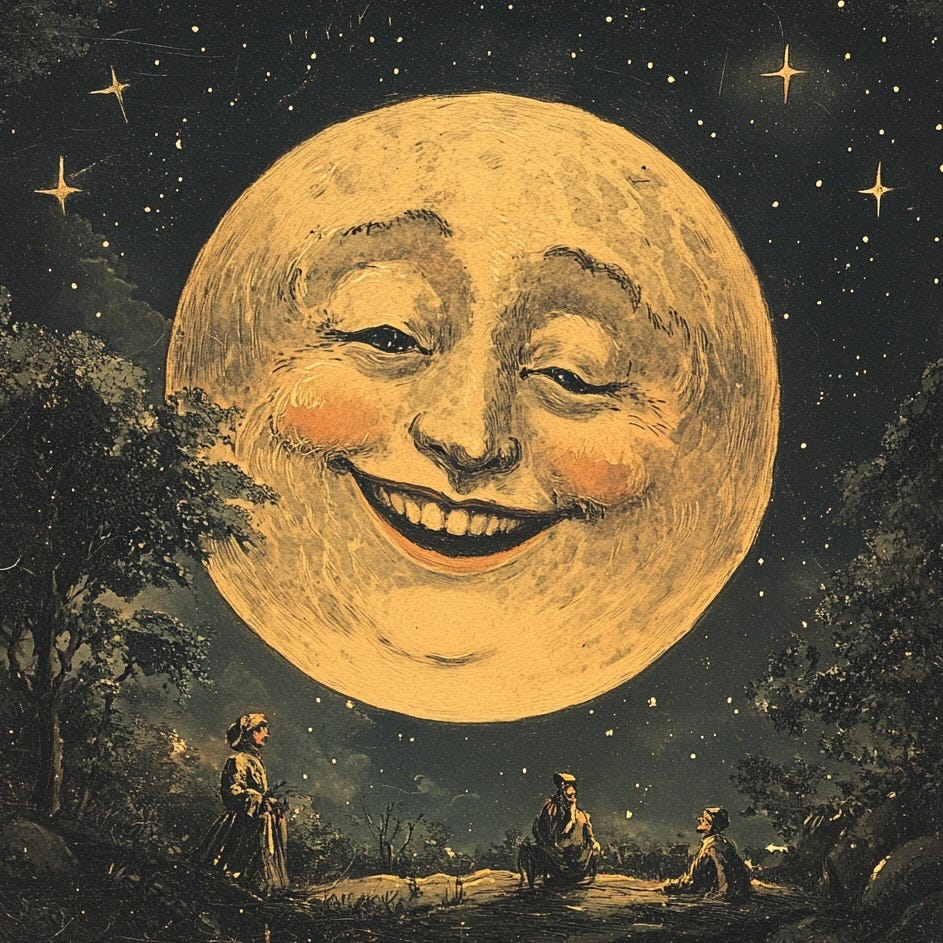For Easter I wanted to share this lighthearted folk tale of the Brothers Grimm. “Der Mond” (The Moon) was story number 175 in the 1857 edition of Kinder- und Hausmärchen (Children’s and Household Tales) of Jacob and Wilhelm Grimm, which would be the last edition of their tales published in their lifetime. It is based on a story called “Das Mondenlicht” (Moonlight) from Heinrich Pröhle’s 1854 anthology, Märchen für die Jugend (Tales for the Young). The following is an adaptation with a few embellishments.
The Moon
In ancient times, there was no moon in the night sky and the stars could not be seen. So when the sun went down, an impenetrable darkness filled the land; and only fools wandered into it without sufficient light to guide their way. On one such night, four men walked side by side in a foreign land, with three lanterns held between them.
Although it was late and they were heading west, the hilltop ahead was bathed in a crepuscular light as if the sun were about to dip beneath the horizon. When they crested the bluff they saw in the valley below what looked like a shimmering orb hanging in an oak tree at the edge of the forest. Its flame shed so much light on the region that the citizens of the town nearby were able to go about their business as if it were dusk.
They asked a farmer passing by what the strange orb was. He said, “It’s called a moon. Our mayor bought it from a peddler for three talers and hung it up in that oak tree. It does a pretty good job lighting up the district. But each day the oil needs to be replenished, and the wick has to be trimmed. We pay the mayor a taler a week to do this. So his purchase is turning him quite a profit.”
When the farmer left, one of the four said, “I think we should steal this moon. We can load it onto an oxcart and take it back to our own kingdom. We have an oak tree like this one and can hang it from there. And we four can tend to the oil and wick.” His companions agreed that this was a sound proposal.
So they stole the moon, loaded it onto an oxcart, and hauled it away. When they got back to their kingdom, they hung it in an oak and explained to the denizens of the region what it was. Everyone was amazed. And each night, the dwarfs came out of their mountains to admire it, while the red-clad fairies disported themselves in the vast moonlit meadows.
The king was so delighted that he decreed that the four men who had found the moon and brought to his kingdom would be legally recognized as its sole owners for the remainder of their lives; and it would be up to them to decide how to dispose of it when they died.
When the first man was on his last leg, he said he wanted to have a quarter of the moon buried with him. So when he died, his companions carved off a quarter and put it in his coffin. When the second died, he requested the same; and again with the third and fourth. But when the fourth died, it was left to the king to put the final quarter of the moon in the man’s coffin.
Because the four men were thieves and had taken what was not rightly theirs, they ended up in Hell. But once there, they became so annoyed by how dark the netherworld was that they decided to reassemble the moon and hang it from a yew tree in the Valley of Death.
The other dead souls (whose eyes were not accustomed to bright lights) were at first alarmed by the moon’s appearance. But when they realized that the moon’s beams were not as garish as the sun’s they fell in love with it. And this is why the dead to this day can often be seen dancing beneath a full moon.
But the longer the moon hung in Hell, the more the dead began to do the things that got them sent there in the first place. The road to Perdition has always been a smooth one to travel, but now that it was lit-up, the dead saw that it was lined with taverns. So they resorted to these, where they got drunk, gambled, and brawled. And a few of them even murdered their friends once again for old times’ sake.
Saint Peter, who was standing at the Pearly Gates, became so alarmed by the universal hubbub bubbling up from under him, that he began to fret and wonder if the denizens of Hell were plotting a new insurrection.
So he went down to investigate. And when he saw what was going on, he told the dead to stop chattering, put down their beers, and listen up.
“Look,” he said, “this won’t do. You’re not here to have fun. You’re supposed to be suffering. I’m taking this moon with me, because it’s turned you all into lunatics. You need to get back to groaning and wailing and gnashing your teeth and whatnot. That’s all I have to say. So get to it.”
Sheepishly, the dead returned to their everlasting torments: the fiery furnaces, the beds of nails, the whipping posts. And when Saint Peter saw that chaos had been restored to Hell (in an orderly fashion), he went back up to Heaven. But before he returned to the Pearly Gates, he climbed a ladder and hung the moon on a silver hook high above the clouds.
And when he did this, something marvelous happened. From that point on, the moon not only shed its light upon the Earth, but revealed to all God’s creatures below that the night sky was full of twinkling stars.











Grimm’s fairy tales are so interesting!!! Love this. Happy Easter! ☀️🌕
Tightly written and engaging.
The last image reminds me of Jackie Gleason's face beaming out of the moon at the start of each episode of "The Honeymooners".